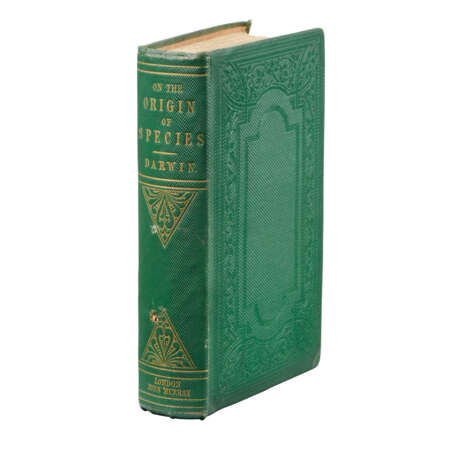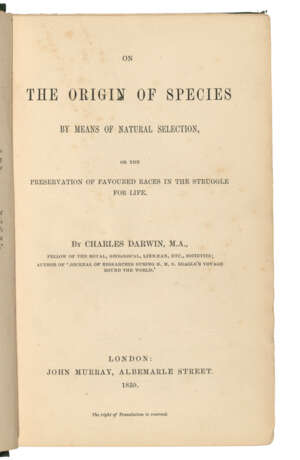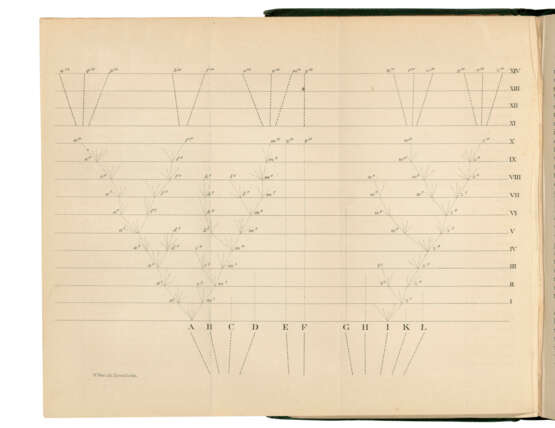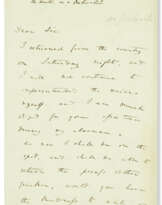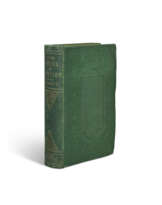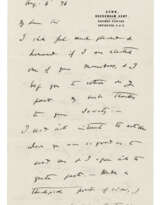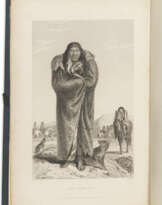ID 794383
Lot 140 | DARWIN, Charles Robert (1809-1882)
Estimate value
£ 100 000 – 150 000
On the Origin of Species by Means of Natural Selection. London: John Murray, 1859.
First edition of 'the most important single work in science' (Dibner). 'It will live as long as the "Principia" of Newton ... Mr. Darwin has given the world a new science, and his name should in my opinion, stand above that of every philosopher of ancient and modern times. The force of admiration can no further go!!!' (Alfred Russel Wallace, quoted by Janet Browne, Charles Darwin II, pp.139-140). Although some key observations and findings from the voyage of the Beagle acted as his initial inspiration, Darwin's ideas about the beneficial mutation of species did not cohere into the theory of evolution until his reading of Thomas Malthus's Essay on the Principle of Population in the latter half of 1838. The gestation of the theory was slow, but in 1856, following a conversation with Sir Charles Lyell about his hypothesis, Darwin was determined to bring it to a conclusion. Two years later he had composed an extended treatise entitled 'Natural Selection', some two thirds complete at 250,000 words. Then in June 1858, Darwin received a letter about evolution from Alfred Russel Wallace, who had independently arrived at similar conclusions. The two scientists issued a joint paper on the subject at the Linnean Society on 1 July. Darwin was now forced to publish, and urged on by Hooker, he condensed his big book into an 'abstract' of some 155,000 words. 'The book, stripped of references and academic paraphernalia, was aimed not at the specialists, but directly at the reading public'. Finally published as On the Origin of Species on 24 November 1859, it expounded a theory of evolution that was recognisably superior and of infinitely greater impact than all previous hypotheses explaining biological diversity. The only portion of Darwin's larger work to be published was Variation of Animals and Plants Under Domestication in 1868. 'A turning point, not only in the history of science, but in the history of ideas in general' (DSB). Dibner Heralds of Science 199; Eimas Heirs 1724; Freeman 373; Garrison-Morton (1991) 220; Grolier, Science 23b; Norman 593; PMM 344b; Milestones of Science 49; Waller 10786.
Octavo-in-12s (198 x 124mm). Half-title, folding lithographic diagram, 32pp. of publisher's adverts at end dated June 1859 in Freeman’s variant 3 (no priority; very small triangle of paper stuck to half-title, a few leaves at the beginning and end with light insignificant finger-soiling mainly confined to margins, tiny spot on pp.343-4 just touching a few letters, faint marginal staining to pp.352-361). Original publisher's green cloth by Edmonds and Remnants with their ticket (Freeman's variant b, inner hinges cracked, extremities lightly rubbed with small snag in spine just into gilt lower triangle device, tiny white mark just touching gilt upper triangle on spine, the head- and tailcaps and corners lightly bruised); contained in a modern marbled-paper covered box. Provenance: occasional light pencil markings in margins.
Special notice
No VAT on hammer price or buyer's premium.
| Artist: | Charles Robert Darwin (1809 - 1882) |
|---|---|
| Place of origin: | Northern Europe, Europe, United Kingdom |
| Auction house category: | Medicine & science, Printed books |
| Artist: | Charles Robert Darwin (1809 - 1882) |
|---|---|
| Place of origin: | Northern Europe, Europe, United Kingdom |
| Auction house category: | Medicine & science, Printed books |
| Address of auction |
CHRISTIE'S 8 King Street, St. James's SW1Y 6QT London United Kingdom | |
|---|---|---|
| Preview |
| |
| Phone | +44 (0)20 7839 9060 | |
| Buyer Premium | see on Website | |
| Conditions of purchase | Conditions of purchase |
